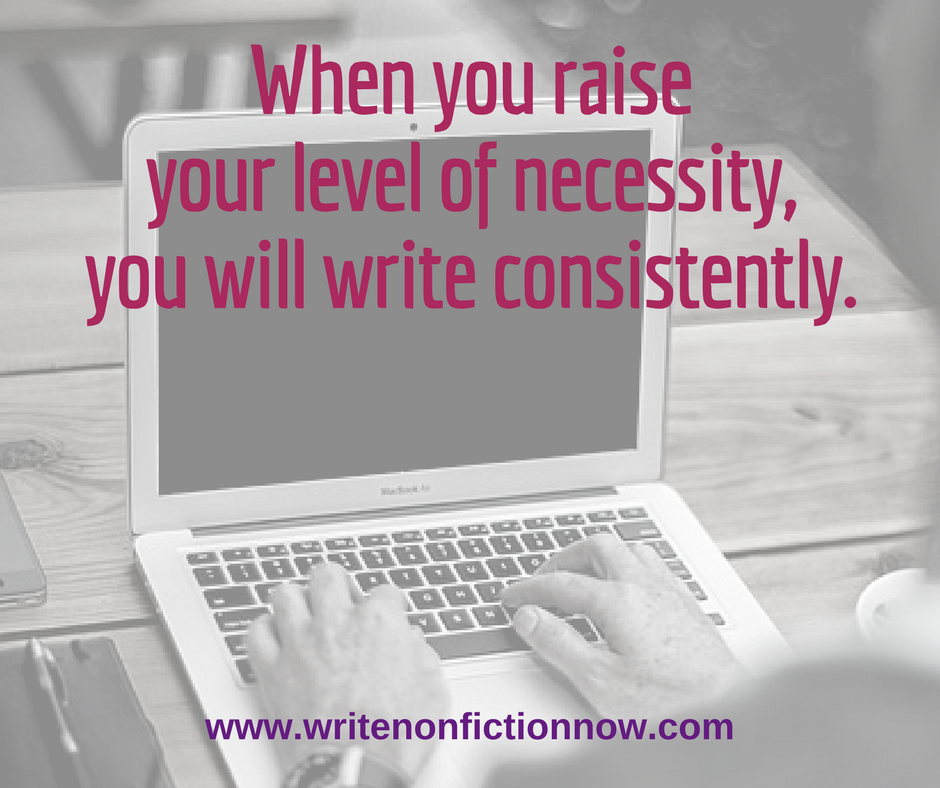 The most significant challenge writers face is learning to write consistently. They say they want to write daily but instead do so sporadically if at all.
The most significant challenge writers face is learning to write consistently. They say they want to write daily but instead do so sporadically if at all.
I bet you understand—unless you are one of the few who sits down at the computer every day at the same time and knocks out a specific number of words or manuscript pages. You are a “real” writer because you write consistently. You have a writing habit.
If you aren’t, you’ve probably tried to create a writing habit and failed. Don’t feel bad; you aren’t alone.
But here’s the truth: You can write consistently. You can develop the habit of writing daily. All you need is one thing…
Necessity.
Raise Your Necessity
Writers who don’t write consistently don’t feel the necessity to do so. It’s that simple.
Necessity is defined most-often as something required or indispensable. Simply said, it’s something that must happen. That’s why so many productive writers say they “must” write.
In the world of high performance, necessity—or raising the level of necessity—is seen as a habit. The most productive people in the world do whatever they can to increase their level of necessity to push themselves to get more done promptly.
Four Factors of Necessity
In his groundbreaking bestseller High Performance Habits, Brendon Burchard identifies four factors that related to performance necessity. He calls them the Four Forces of Necessity. They are:
- Identity
- Obsession
- Duty
- Urgency
Let’s break each factor down so you can see how developing this “force” will help you write consistently.
1. Identity
When you say you are a writer, you tie your identity to the activity of writing. Therefore, consistently not writing affects your feelings about yourself and who you believe you are.
When you don’t write, you probably feel frustrated, disappointed in yourself, or like a failure. The reason why is simple: You know you aren’t performing up to your standards. You aren’t fulfilling your potential or your purpose as a writer. You aren’t behaving as a writer–the person you want or know you can be.
To step into that role—and to relieve your negative thoughts and feelings about yourself, you must write. It becomes necessary to write consistently. As you do, you live as a writer.
2. Obsession
Are you one of those people who can’t stop talking about the topic of your book or blog? Do you research and study your subject every chance you get? Do people often say you are “obsessed” with that topic?
Good!
High-performing writers are curious people who have a high desire to master their field of interest. They find their topic and writing project enjoyable, exciting, and personally satisfying. They are more than passionate about their subject area or projects; they are, indeed, obsessed with them.
And guess what? You obsession adds to your identity. Because you value it so highly, it becomes part of you. Not only that, since it feeds your mind and spirit, it becomes necessary.
Therefore, if you are obsessed with your writing project, you find it necessary to work on it consistently.
3. Duty
For whom are you writing this book? Indeed, not for yourself. You are writing it for someone else—maybe your children or a particular group of people, for instance. You feel an internal push to leave a legacy, make a difference, inspire, motivate, or help, right?
Nonfiction writers are more often than not what I call “authors of change.” You, too, want to make a positive and meaningful difference in your readers’ lives.
Congratulations!
But your sense of duty must be strong enough to get you to sit down and write each day. How do you raise your necessity here? Consider the people who won’t be impacted positively by your words if you never write and publish your work. That’s right…who will NOT receive the benefit of reading your book if you never release it?
Of course, not writing the book impacts you as well; you won’t become a writer or author. However, not writing the book impacts your potential readers as well…the people who need to receive the wisdom and information you can offer.
Think about that each time you feel the need to increase your sense of necessity.
4. Urgency
Is there a fire burning under your butt to complete your writing project? If not, set some deadlines. And don’t be kind about them. Push yourself…create a challenge to finish sooner rather than later.
Remember: Your potential readers are waiting. Every day that passes is one more when they do not have the information, tools, strategies, tips, motivation, or inspiration you (through your writing) can provide. They need your book…now, not in two or three years.
What would happen if you became unable to write the book…you developed crippling arthritis in your hands or, God forbid, died? Those people wouldn’t ever get a chance to read your book.
High-performing writers live by deadlines; that sense of urgency keeps them moving forward. So, set a deadline—and meet it! Get that book into your reader’s hands.
February Nonfiction Writer’s Challenge: Write Consistently
To begin writing more consistently, increase your level of necessity. That’s it…
How?
1. Step into the “writer” identity. Set new standards, self-monitor your daily writing habit, and get comfortable with taking a hard look at your performance—and making necessary changes, so you write daily. Expect more of yourself…and don’t let yourself off the hook when it comes to meeting those expectations.
2. Get obsessed. Find a topic to write about that sparks your interest. Then dork out on it! Research. Read. Take classes. Talk to experts. Master your topic. And as you learn, share! Write.
3. Fulfill your duty Focus on being of service to your readers. Tap into your sense of purpose—in your life or as a writer. If you feel writing is a calling, heed it. Write for your readers.
4. Feel the urgency. Remember that your readers are waiting for your book, and you never know what could happen tomorrow. Set deadlines—not wishy-washy-maybe-I’ll-meet-it deadlines. Set drop-dead-meet-them-or-else deadlines. And work toward those writing deadline daily.
Do those four things and your level of necessity will skyrocket. As a result, you will find yourself writing consistently.
Let me know how you are doing with this challenge by leaving a comment below. Also, grab a copy of my ebook, 20 High-Performance Strategies and Habits You can Implement Today.
 For more information on setting goals and creating a plan to achieve them, join the Nonfiction Writers’ University (NFWU). During January, all the NFWU events will revolve around this topic. As the year progresses, I will provide a variety of resources to help you achieve your goals. You can join the Nonfiction Writers’ University for a $1 trial period of 30 days*! When you do, you get access to four years of great content housed in the NFWU as well as monthly educational events, virtual writing sessions, group coaching, and video trainings.*After the 30-day trial period you will be charged $37 per month for NWU membership until you cancel.
For more information on setting goals and creating a plan to achieve them, join the Nonfiction Writers’ University (NFWU). During January, all the NFWU events will revolve around this topic. As the year progresses, I will provide a variety of resources to help you achieve your goals. You can join the Nonfiction Writers’ University for a $1 trial period of 30 days*! When you do, you get access to four years of great content housed in the NFWU as well as monthly educational events, virtual writing sessions, group coaching, and video trainings.*After the 30-day trial period you will be charged $37 per month for NWU membership until you cancel.
Photo courtesy of Free-Photos / Pixabay.com
Cary Richards says
Yes, I really think you need to develop an obsession of sorts. (In as healthy a way as possible) But an obsession nonetheless.
Lou Hunley says
I just started my book last month but I am doing all these things.
Nina Amir says
Awesome, Lou!